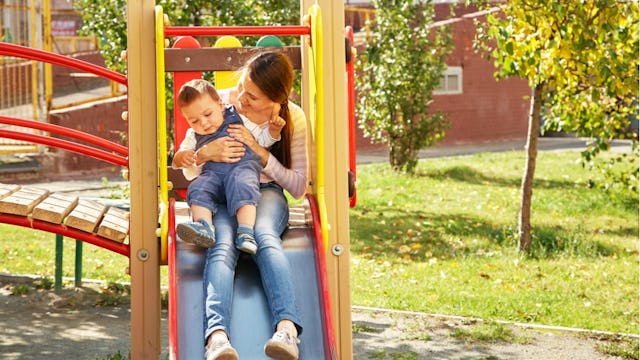Be Careful When You Are Going Down A Slide With Your Child On Your Lap

We’ve all been there. We’re at the playground with our tiny child, who’s shrieking at the top of their lungs that they want to go down the steep, twisty slide. It looks slightly treacherous, but also absolutely magical, at least from the perspective of a kid. So we do what any thoughtful, responsible parent would do: We sit our little one on our lap, hold on tight, and slide down, giggling and shrieking right along with our kid.
Except it turns out that going down a slide with a child on your lap is actually quite dangerous and can frequently result in broken bones.
Yep, you read that right. I had no idea either. Literally none.
And I know the “overbearing,” “helicopter,” and eye-roll comments are starting, but hear me out:
When a kid goes down a slide wearing rubber-soled shoes (like most of our kids do), the shoe can cause traction, and pretty easily stick to the sliding board. Add the weight of a parent in back, pushing the child from behind, and you find yourself in a potentially dangerous situation.
As Dr. Diane Arnaout, a pediatrician at Cook Children’s Health Care System describes it: “If any part of that kiddo’s shoe sticks to the sliding board, and the parent’s weight is pushing everything downwards — pop — the leg twists and shin bone cracks.”
Holy crap, right? The injury typically resulting from this is called a tibial spiral fracture (break of the shin bone). And apparently this is not a freak occurrence. Dr. Arnaout cites a study that found that up to 14% of tibial spiral fractures result from parents taking their kids down the slide on their laps.
The study, which tracked kids at Winthrop Hospital in Mineola, New York, who’d experienced slide-related injuries, found that every single slide injury for kids under 3 happened while riding on a parent’s lap. Yikes!
According to The New York Times, which covered this injury in detail in 2012, these fractures aren’t immediately apparent. Your child might just kind of be limping around or complaining of pain before you realize what has happened. Thankfully, the injury isn’t the most serious one out there (though I bet it hurts like hell for a little kid). The fracture is usually treated with a cast, placed from the foot to just above the knee. Surgery is not required in most cases, and most kids recover within four to six weeks without lasting issues.
As Dr. Arnaout says the only way to prevent this injury is to just avoid going down the slide with your kid. She suggests standing on the side of the slide and holding your child’s hand, which seems reasonable.
The thing that strikes me about this is just how counterintuitive the whole thing is. You think you’re actually helping your kid stay safe, but it’s actually a serious risk of injury. And it’s such a common thing that almost no parents even know about!
I can only imagine how much guilt any parent whose child got hurt this way must feel too. Watching your child in pain, and having to deal with hospital visits, decreased mobility, and helping your child adjust to wearing a cast for a month must be no picnic. But to know you caused the problem in the first place — that must be pretty hard to handle for a parent’s heart.
However, given the fact that this is such a little-known fact at this point, parents who have done this (so, basically all of us) without knowing the potential consequences absolutely shouldn’t feel guilty about it.
However, now that I know about this freakish injury, there is no way I’d ever take a chance and let my kid go down the slide on my lap (or anyone else’s). And if I see a parent doing so at a park, I will likely let them know as well. I’ll do it kindly — I’m not a sanctimonious jerk by any means, but I would want someone to tell me. So yeah, I’ll probably end up being that annoying parent at the park spouting off safety warnings now.
But who cares, right? It’s always better to be safe than sorry, in my view, especially when it comes to our precious kids.
This article was originally published on